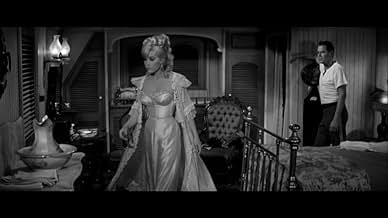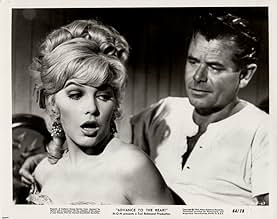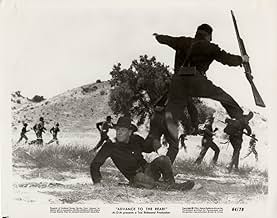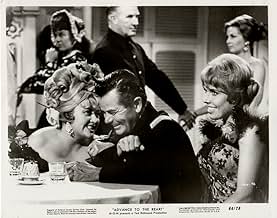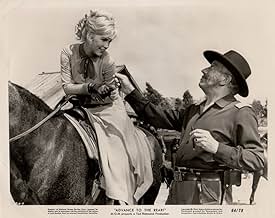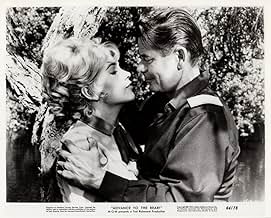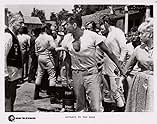IMDb RATING
5.9/10
940
YOUR RATING
When A Union Army outfit of misfits and rejects is sent to the Western territory, Southern spies try to figure out what they're doing there.When A Union Army outfit of misfits and rejects is sent to the Western territory, Southern spies try to figure out what they're doing there.When A Union Army outfit of misfits and rejects is sent to the Western territory, Southern spies try to figure out what they're doing there.
Alan Hale Jr.
- Sergeant Davis
- (as Alan Hale)
Richard Adams
- Courier
- (uncredited)
Leon Alton
- Waiter
- (uncredited)
Robert Anderson
- Steamboat Captain
- (uncredited)
Ann Blake
- Member of the Law & Order League
- (uncredited)
Danny Borzage
- Trooper
- (uncredited)
Featured reviews
I have just finished reading Jack Schaefer's book, "Company of Cowards", and by coincidence, I watched this film on TCM this morning. I have to say that, apart from the names of some of the characters, this film bears very little resemblance to the book. For example, in the film, the character of Hugo Zattig, is a villainous and duplicitous, Confederate officer, played by James Griffith. In the book, the character is one of the "Company of Cowards", whose honour is redeemed at the end of the book.
Technically, the book was a historical novel, centred around the fictional character of Jared Heath, himself a disgraced Union officer, busted to sergeant, who was detailed to take charge of a company of other disgraced officers who had also been demoted for crimes such as desertion, disobedience, brawling and other such offences that are not tolerated in any Army, past or present. The end of the novel describes how Jared Heath and his "Company of Cowards" manage to redeem themselves during a heroic battle against Comanche and the Kiowa Indians, with a few of them giving their own lives in the heat of battle.
I should imagine that the producers and MGM had a lot of debate about how this film should be made. Was it to be a film about the true horrors of war and how disgraced soldiers were treated by the other troopers, as depicted in the novel? No, it was to be made as a knockabout comedy, directed by George Marshall, who had already directed James Stewart in "Destry Rides Again" and Glen Ford in a few other films, such as another comedy western, "The Sheepman".
A question had already asked as to whether the television comedy series, "F Troop" was loosely based on this film. Well, as the series was released on ABC a year later, it is probably more than a coincidence that the producers of the series did take some inspiration from this film. Ken Berry would have been a more naïve version of the Glen Ford character.
Jack Schaefer's novel was a very serious study on how the American Civil War was fought, which went on to describe the horror of fighting in the Indians Wars, when many hostile Indian tribes took advantage of the fact that the "white men" were distracted with fighting each other.
There were also some political comments about why the Union government kept changing its mind as to the reason for the war, starting out with political wrangles about why the Federal Government should have control over the distant Southern States; with the economic disparity between the Southern States and the Northern States; the need to keep the Union together; and, finally, the Abolition of Slavery.
Jack Schaefer wrote "Shane", one of the greatest and most realistic westerns ever written and filmed - I wonder what he thought of how his original novel was brought to the screen.
I will give the film 8 out of 10 for the lively performances of Glen Ford and the lovely Stella Stevens.
Technically, the book was a historical novel, centred around the fictional character of Jared Heath, himself a disgraced Union officer, busted to sergeant, who was detailed to take charge of a company of other disgraced officers who had also been demoted for crimes such as desertion, disobedience, brawling and other such offences that are not tolerated in any Army, past or present. The end of the novel describes how Jared Heath and his "Company of Cowards" manage to redeem themselves during a heroic battle against Comanche and the Kiowa Indians, with a few of them giving their own lives in the heat of battle.
I should imagine that the producers and MGM had a lot of debate about how this film should be made. Was it to be a film about the true horrors of war and how disgraced soldiers were treated by the other troopers, as depicted in the novel? No, it was to be made as a knockabout comedy, directed by George Marshall, who had already directed James Stewart in "Destry Rides Again" and Glen Ford in a few other films, such as another comedy western, "The Sheepman".
A question had already asked as to whether the television comedy series, "F Troop" was loosely based on this film. Well, as the series was released on ABC a year later, it is probably more than a coincidence that the producers of the series did take some inspiration from this film. Ken Berry would have been a more naïve version of the Glen Ford character.
Jack Schaefer's novel was a very serious study on how the American Civil War was fought, which went on to describe the horror of fighting in the Indians Wars, when many hostile Indian tribes took advantage of the fact that the "white men" were distracted with fighting each other.
There were also some political comments about why the Union government kept changing its mind as to the reason for the war, starting out with political wrangles about why the Federal Government should have control over the distant Southern States; with the economic disparity between the Southern States and the Northern States; the need to keep the Union together; and, finally, the Abolition of Slavery.
Jack Schaefer wrote "Shane", one of the greatest and most realistic westerns ever written and filmed - I wonder what he thought of how his original novel was brought to the screen.
I will give the film 8 out of 10 for the lively performances of Glen Ford and the lovely Stella Stevens.
Advance to the Rear is the last of a string of films that Glenn Ford made with director George Marshall. As an actor/director combination, they don't rate as high as John Wayne/John Ford or Robert DeNiro/Martin Scorsese, but they did turn out a succession of very funny films.
Back at the beginning of Ford's career, Marshall directed him in Texas along with another young star Bill Holden. Than it was almost a decade until they worked together again in one of Ford's best and probably funniest film, The Sheepman.
Ford had not done that much comedy up till then. Marshall took great advantage of Glenn Ford's really great gift for deadpanning some fabulous lines. They did five more films after that and Ford used him in his television series Cade's County. A good director/actor team turning out some great product.
I think George Marshall's not been given his due. He was best at comedy, but could also turn out good westerns. His most noted film, Destry Rides Again is a great blend of both.
Ford is a newly assigned lieutenant in a company that bears a striking resemblance to F Troop. Possibly this film was the inspiration for same. After a major snafu, they are assigned out in the west where it is hoped they cannot do too much damage to the Union cause.
And then it's discovered they are to be protecting a major gold shipment that Confederate guerrilla James Griffith is out to steal. Ford has an additional complication in that he's fallen for Confederate spy Stella Stevens.
You'll have a lot of laughs along the way in seeing if and how all these situations are dealt with. Another performance of note here is Melvyn Douglas as the commanding officer of the company. Douglas, two years past his Oscar for Hud, gets a real change of pace and he looks like he's having a ball playing the bumbling and pompous Colonel Brackenby.
Watch this one and you're in for good afternoon's share of laughs.
Back at the beginning of Ford's career, Marshall directed him in Texas along with another young star Bill Holden. Than it was almost a decade until they worked together again in one of Ford's best and probably funniest film, The Sheepman.
Ford had not done that much comedy up till then. Marshall took great advantage of Glenn Ford's really great gift for deadpanning some fabulous lines. They did five more films after that and Ford used him in his television series Cade's County. A good director/actor team turning out some great product.
I think George Marshall's not been given his due. He was best at comedy, but could also turn out good westerns. His most noted film, Destry Rides Again is a great blend of both.
Ford is a newly assigned lieutenant in a company that bears a striking resemblance to F Troop. Possibly this film was the inspiration for same. After a major snafu, they are assigned out in the west where it is hoped they cannot do too much damage to the Union cause.
And then it's discovered they are to be protecting a major gold shipment that Confederate guerrilla James Griffith is out to steal. Ford has an additional complication in that he's fallen for Confederate spy Stella Stevens.
You'll have a lot of laughs along the way in seeing if and how all these situations are dealt with. Another performance of note here is Melvyn Douglas as the commanding officer of the company. Douglas, two years past his Oscar for Hud, gets a real change of pace and he looks like he's having a ball playing the bumbling and pompous Colonel Brackenby.
Watch this one and you're in for good afternoon's share of laughs.
As others are who have studied the long and estimable body of his work, I am a great admirer of George Marshall. The versatile director had an ability to tell a story with a camera that was legendary; in "Advance to the Rear" he found, I suggest, one of his richest hoards of cinematic possibilities. The story-line of this rare historical comedy takes the viewer back to the final days of the Civil War is winding to an inevitable close; so the commander of one contingent of union soldiers has made a separate truce with his Confederate counterpart. At a prearranged time, a single cannon round, fired to miss, is set off by each side. And that is their daily war. Period. This life-preserving but odd arrangement works quite well, until a youthful officer, recently posted to the "Company of Cowards", the name in the original novel from which the narrative was extracted, sallies forth and captures some of "the Rebs". This precipitate action of course obliges their equally reluctant "enemies" to do something else, that starts to look like an act of war. "What have you done?" the union Colonel bellows at him, "Take them back! How many times have I instructed you not to show initiative?" The company depicted obviously bears a striking resemblance to "F Troop"; this film was undoubtedly the model for that enjoyable TV series.. After a major mess ensues, the group are dispatched to the West where it is hoped they cannot do too much damage to the Union cause. And then the viewer learns these misfits will have to protect a large gold shipment that Confederate guerrillas will really be trying to make away with.. The young officer has another thorn in his side; the complication is that he has fallen head-over-heels for a gung-ho and gorgeous female Confederate spy. What happens next has to be seen to be howled at. The actors in this colorful comedy-and adventure and romance are under-appreciated Glenn Ford, the ultra-skilled award-level Melvyn Douglas as the Union colonel in question, Stella Stevens as the well-constructed spy, and a large number of very good supporting actors including Jim Backus, Joan Blondell, Whit Bissell, Andrew Prine, Jesse Pearson, Michael Pate, Alan Hale, Jr., James Griffith, and many more in smaller roles. The writers credited with this hilarious screenplay, probably also an inspiration for "Hogan's Heroes" included veteran screenwriter William Bowers, Robert Carson, Samuel A. Peeples and Jack Schaefer. The music was provided by Randy Sparks, the vivid cinematography by the talented Milton Krasner. The very fine art direction was done by George W. Davis and George Imazu, with set decoration by Budd Friend and tasteful Henry Grace, with costumes by Walter Plunkett, makeup by the legendary William Tuttle and hairstyles by Sydney Guilaroff. This is a film which has everything I suggest that a comedy could ask for--a strong central character, a clear set of goals, well- developed characters, humor born out of situation, character and reaction, and a first-rate production in the hands of a director who gives every moment its due but never slows down the pace. Please watch this feature the next time it is presented; I believe you will appreciate its classic comedy mood as much as I do. I suggest it is a one-of-kind comedy although very often imitated.
Comedy is a funny animal. You never know when laughter is going to strike next, and you just never know what you're going to find funny. Recently, I laughed in child-like glee during Walt Disney's "Pinocchio", and all the way through the 1931 French farce "Le Million". I found the 2009 romantic comedy "I Love You, Man" delightful, and I almost had to call 911 I was laughing so hard during "The Sunshine Boys". but Stanley Kramer's laborious, sour, mammoth wannabe laff-fest "It's a Mad (etc.) World" didn't elicit a single chuckle from me. I believe that the harder the film-maker seems to be trying, the less likely it is that he'll succeed. The best comedy, no matter how many hours are spent setting up a gag, must appear as if it happens totally by accident. But one thing for sure - laughter is a gift. I'll take it wherever I can find it.
"Advance to the Rear" is a funny movie. It made me laugh. There you have it. That's my review. Part of me feels that this movie shouldn't work. It's a total contrivance. But it's so feather-light, so airy, so unpretentious, and so good-natured that one just gives in to it. It's as if the film-makers and the actors are saying: "We've put together this little concoction for your amusement, and we hope that you have a good time." It helps that Glenn Ford and Melvyn Douglas are the stars - Ford taking things way too seriously and becoming seriously undone, and Douglas, demoted to Captain, wincing at every mishap and quite beside himself about what his wife will think ("I married well! All my friends are generals!"). Even if you don't think that men running around in their long-johns is funny you might get a hoot out of the injun from West Point, the guy whose scent attracts horses and the ski attack on water barrel rings. As for Stella Stevens - she can be the angel on top of my Christmas tree anytime.
"Advance to the Rear" is a funny movie. It made me laugh. There you have it. That's my review. Part of me feels that this movie shouldn't work. It's a total contrivance. But it's so feather-light, so airy, so unpretentious, and so good-natured that one just gives in to it. It's as if the film-makers and the actors are saying: "We've put together this little concoction for your amusement, and we hope that you have a good time." It helps that Glenn Ford and Melvyn Douglas are the stars - Ford taking things way too seriously and becoming seriously undone, and Douglas, demoted to Captain, wincing at every mishap and quite beside himself about what his wife will think ("I married well! All my friends are generals!"). Even if you don't think that men running around in their long-johns is funny you might get a hoot out of the injun from West Point, the guy whose scent attracts horses and the ski attack on water barrel rings. As for Stella Stevens - she can be the angel on top of my Christmas tree anytime.
This film was shown on Turner Classic Movies and in the absence of other reviews, this review is for the film itself, only. It's also known as "Advance In Reverse".
It's not hard to fall into liking this easy-going and ramshackle comedy, which switches easily from knockabout physical humour (with 'assorted' sound effects) to silly dialogue and a general feel that the assorted misfits of this Union regiment just aren't taking their roles that seriously. The story, for what it is has the regiment being sent out of reach of action but still manage to capture a rebel spy, played by Stella Stevens and they all end up in a heap of trouble. A $2 million gold bullion gets in the mix as do some rather "friendly" Indians.
Glenn Ford is easily the most recognisable as the captain and Melvyn Douglas as the Colonel "in charge" and these two string it all together and he's not bad at comic timing or deadpan delivery. He has a romantic fling with Stevens, as all the regiment do (in their dreams!) Destry Rides Again director George Stevens' film is in widescreen and (here) an attractively dark-greened tinged black & white and which runs for 96mins.
The comedy is gentle and clever rather than broad, or crude and the targets are fairly obvious but as it's all fairly sweet it's all a nicely pleasurable watch rather than anything classic or downright hilarious - though the scene where they storm the camp, dressed in long-johns, with boards on their feet down the dry grass slopes, to the soundtrack of a WW2 fighter plane battle is actually really rather humorous!
It's not hard to fall into liking this easy-going and ramshackle comedy, which switches easily from knockabout physical humour (with 'assorted' sound effects) to silly dialogue and a general feel that the assorted misfits of this Union regiment just aren't taking their roles that seriously. The story, for what it is has the regiment being sent out of reach of action but still manage to capture a rebel spy, played by Stella Stevens and they all end up in a heap of trouble. A $2 million gold bullion gets in the mix as do some rather "friendly" Indians.
Glenn Ford is easily the most recognisable as the captain and Melvyn Douglas as the Colonel "in charge" and these two string it all together and he's not bad at comic timing or deadpan delivery. He has a romantic fling with Stevens, as all the regiment do (in their dreams!) Destry Rides Again director George Stevens' film is in widescreen and (here) an attractively dark-greened tinged black & white and which runs for 96mins.
The comedy is gentle and clever rather than broad, or crude and the targets are fairly obvious but as it's all fairly sweet it's all a nicely pleasurable watch rather than anything classic or downright hilarious - though the scene where they storm the camp, dressed in long-johns, with boards on their feet down the dry grass slopes, to the soundtrack of a WW2 fighter plane battle is actually really rather humorous!
Did you know
- TriviaThe steamboat used in this movie was originally built and used as the Cotton Blossom, in MGM's Show Boat (1951). It was also used in L'arbre de vie (1957) and Les aventuriers du fleuve (1960). In the 1970s, it was one of the props auctioned off by the studio.
- GoofsIn the scenes where the cannons fire 30 rounds, some of the cannons fire before their fuses are ignited.
- Quotes
Martha Lou: All right. Let's say, just for the moment, that I *am* a spy.
Heath: A very pretty one, too.
Martha Lou: That would make us enemies, Jared.
Heath: Yeah, of course it would. And, we'd be starting out at a point in marriage that takes some couples twenty or thirty years to achieve!
- How long is Advance to the Rear?Powered by Alexa
Details
- Runtime1 hour 40 minutes
- Color
- Aspect ratio
- 2.35 : 1
Contribute to this page
Suggest an edit or add missing content

Top Gap
By what name was Le bataillon des lâches (1964) officially released in India in English?
Answer

